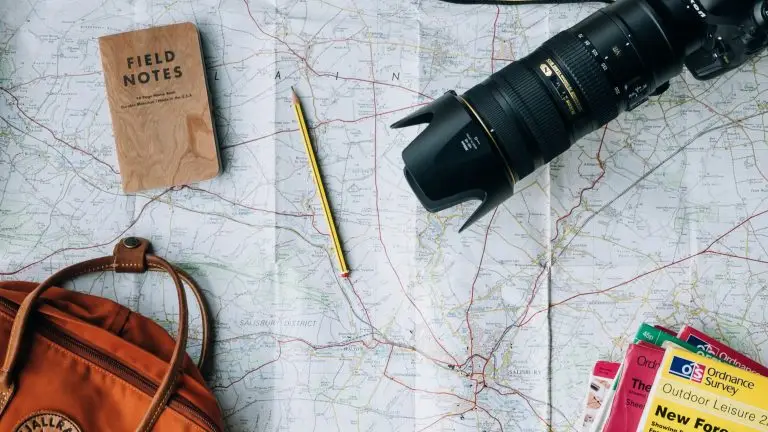
10 Best Chilean Books That Will Surprise You
What are the best Chilean Books? If you ask any literary buff about Pablo Neruda, Isabel Allende, and Roberto Bolaño, they will surely know about these literary giants.
Recently, I wrote about my favorite novels after reading 250 books over the past 10 years. In that post, I only compiled the best fiction books.
It was only a matter of time before I wrote about the best nonfiction books of all time—for me. Now, the list is interesting because, at CulturalReads, I cover different cultures, countries, and wide-ranging topics.
So, the best nonfiction books will not only be about history or politics. I will also cover leadership, finance, health, spiritual books, and self-development books, among others.
These nonfiction books delve into cultural significance, personal insights, and inspirational elements that have influenced me. So, if you are also looking to expand your knowledge and skills or discover yourself, this list will surely resonate and inspire you.
Now, let’s discuss some of the best non fiction books ever, and some of them may become your favorites.

Ryszard Kapuściński is a famous Polish journalist. He was one of the first journalists from a communist country to cover Africa. As a Polish journalist, he traveled across Africa from the 1950s through the 1990s.
Kapuściński used to write 3 versions of each story: (1) a candid personal one, (2) one for Western media, and (3) a censured one for the communist countries. He has written many books on different countries, but this is my favorite.
He was in Africa during the wave of independence, and each story is an adventure followed by the entire history of a country in a few pages. It’s very adventurous and teaches you a lot.
He quickly summarizes each country’s history in a few pages.
The Shadow of the Sun is one of the best selling non fiction books of all time, where you explore Africa’s rich history and diverse cultures. Kapuściński’s prose and observational skills teach us the complex social, political, and economic forces shaping Africa’s past and present.

Tim Ferris has been one of my heroes. I saw him last year at an event and even got a mention in an interview with Tim Ferris because I was sitting next to a journalist who was interviewing him.
Tim Ferris became famous because of the 4-Hour Work Week on outsourcing and setting up structures for your business. What started as typical self-help later turned into more profound interviews in the podcast The Tim Ferris Show, where he learns from athletes, scientists, actors, entrepreneurs, etc, in interviews.
He later wrote two books, Tools of Titans and Tribe of Mentors, which include life lessons, routines, and favorite books and items of inspiring people. It’s a great morning read!
The 4-Hour Workweek is one of my favorites. The book discusses the DEAL process, a framework that guides readers to clarify goals, eliminate non-essential tasks, automate workflows, and achieve the freedom to work from anywhere.
It’s a strategy for working smarter, creating more free time, and increasing productivity. The book also discusses “mini-retirements” instead of delaying enjoyment until retirement. It has thousands of reviews on Amazon, making it one of the best selling non fiction books of all time.

Minimalism has become more important in a time of overconsumption. Marie Kondo’s method is similar to minimalism but slightly different. Her theory is only to keep things that ‘spark joy.’ If you LOVE books, you don’t have to limit yourself to 5 books, but you do limit other categories you care less about.
Her book also provides a beneficial method for cleaning and getting rid of things more easily. I also liked her focus on giving an item to someone who could use it instead of focusing on ‘losing’ it.
She discusses this in her KonMari method, which is a decluttering technique that involves tidying by category rather than by room. The process includes selecting items that “spark joy” and letting go of those that do not, thanking them before discarding them.
If you want to know more about Japan and Japanese literature, check out Japanese books and Japanese cinema.

Two former Navy SEALs wrote this book and later applied their war lessons to business. Although everything Navy-seal-related is always a little extreme, it’s among the best leadership books I’ve ever read.
Each chapter teaches a simple lesson. It starts with a story from one of their military missions and then gives a business example of the same lesson. They stress the need to detach emotionally in high-pressure situations to make better decisions and adapt strategies as needed.
Some of the lessons that stood out for me:
If you are looking for a book that combines the military and corporate worlds, this is one of the best non fiction books of all time. You can check the book on Amazon.

I actually found out about this book in Tim Ferris’s book. He asked people for their favorite book, and Tao Te Ching was often mentioned. It’s timely advice with beautiful texts to sink in. Don’t forget to grab the right translation by Stephen Mitchell—it matters a lot!
The book guides people to live harmoniously with the Tao, or “the Way,” a natural force guiding the universe. He advises leaders to practice “wu wei,” or effortless action, by achieving goals with minimal intervention. This approach encourages individuals to build quiet strength to find contentment and clarity through patience and acceptance.
The book also explores the interplay of opposites, such as strength and softness. For instance, he teaches that softness overcomes hardness and that true strength is often gentle.
Despite being a centuries-old book, it remains one of the best non fiction books of all time. The book is a precious gift if you want to understand Eastern philosophy. If you want to know more about China, check out Chinese books.

Thiago Forte is famous for his company (and book) Building a Second Brain. Before writing his bestsellers, I read Design Your Work. This collection of essays inspired me to organize my work completely differently.
The main idea is that your brain isn’t to hold ideas; it’s for creativity. He shares a system for storing information for better creative use. It’s life-changing.
To achieve that, he introduces a method he calls Building a Second Brain for organizing and leveraging knowledge to increase creativity. His approach focuses on creating a digital system that captures ideas and information to manage work effectively.
He also emphasizes the value of progressive summarization by simplifying notes by distilling them multiple times. This technique enables users to highlight key takeaways, facilitating quick recall and application without revisiting the entire source.

Never Split the Difference is one of the best non fiction books on negotiation. As it happens frequently, I tend to do people-pleasing, which is killing in negotiations. “Sure, that would work. Just pay me whatever you think I’m worth.” It’s understanding that negotiation is a part of life; see it more like a game.
I also liked understanding the different types (impatient, needing details, people-pleasing) and the various ways to tell whether someone is happy. Negotiation—especially at work—is about agreeing that both parties are okay with not getting everything for themselves and having unhappy employees.
Negotiation is a universal skill that impacts every aspect of life, from personal relationships to business transactions. The author, Chris Voss, a former FBI hostage, shares his proven strategies to achieve mutually beneficial outcomes in high-stakes negotiations.
For successful negotiation, he introduces many techniques, such as “Mirroring,” repeating a person’s words to build trust, “Labelling,” identifying their emotions to ease tension, and “Tactical Empathy” (genuinely understanding their perspective). Another method, the “Accusation Audit,” involves addressing any possible objections early.
If you struggle with conversation, especially during negotiation, this is one of the best selling non fiction books of all time, with more than 3 million copies sold.

This is one of the best FREE non-fiction books that collect the lessons of Naval Ravikant, a renowned investor, philosopher, and entrepreneur. It really makes you think and look at things differently.
His idea of creating wealth is through ownership and leverage. For example, focusing on scalable skills, like coding or media creation, can multiply your efforts with fewer hours. He believes wealth should not come from endless work but from owning assets that grow and generate value over time.
However, what I liked about this one of the best non fiction books ever is its emphasis on happiness as a personal skill. Since it’s a skill, you can develop independently of wealth. Happiness, for him, is about cultivating peace of mind by minimizing desires and understanding oneself.
He also believes in lifelong learning and curiosity. And one can be curious only by reading for interest rather than obligation. In doing so, we can achieve both external success and internal peace. You can download the book for FREE!

This book is for anyone interested in spiritual teachings, Indigenous tribes, and adventure. Mark Plotkin is a Harvard Ethnobotanist and student of the famous Richard Evans Schultes, who was the first Westerner to discover Ayuahuasca (one of the key figures in one of the best Colombian movies, The Embrace of the Serpent.
The book explores Amazonian indigenous tribes and their deep connection to nature through a young apprentice learning from shamans. Plotkin spent time in the Amazon rainforest to learn about medicinal plants, spiritual practices, and how indigenous peoples see the world.
However, there’s a deeper purpose at stake, as Plotkin calls for an emergency to protect these cultures’ ecological wisdom. This is particularly more relevant now due to deforestation and globalization.
Another interesting theme in this one of the best non fiction books of all time is the value of indigenous knowledge in contemporary medicine and environmental conservation. He advocates collaboration between Western science and indigenous practices for innovative solutions to ecological challenges.

I’d recommend this book if you like cooking. It provides many insights and great tips. This cookbook demystifies cooking by focusing on four essential elements: salt, fat, acid, and heat. Nosrat argues that mastering these components enables cooks to create flavorful dishes.
Interestingly, the book is structured around these four elements. For example, salt increases flavor and is necessary for seasoning. Fat adds richness and helps the cooking process, while Acid brightens dishes and balances flavors. Finally, Heat is about understanding different cooking methods.
The book also has illustrations by Wendy MacNaughton, making the concepts more accessible. So, rather than just providing recipes, she encourages readers to understand cooking to improvise on what they have available.
The book has sold over one million copies, making it one of the best non fiction books of all time. Its educational approach to cooking has transformed people’s views of the culinary arts.

If you are looking for one transformative self-help book that challenges you to break away from societal “brules” (bullshit rules), this is the book to read. It has the framework to reshape your mindset through unique principles and mental models.
A central framework starts by questioning conventional beliefs that limit individual potential. By rejecting these outdated norms, you redefine success on your terms. With concepts like “Blissipline,” the discipline of cultivating joy, you learn mindfulness and gratitude practices.
Lakhiani also introduces the Four Stages of Consciousness. These stages outline a roadmap for self-discovery, which involves passively following society’s rules to create a life of purpose.
With its mix of philosophy, psychology, and actionable advice, The Code of the Extraordinary Mind is one of the good non fiction history books. I liked frameworks like the 12 areas of life, which I still use.

This was Steve Jobs’s favorite book. It is an incredible story of one of the yogis who brought yoga to the West. It’s hard to believe that everything in this book is true, which is exactly what makes you rethink reality. It is also a great documentary.
This classic book is a recollection that recounts the author’s journey to self-realization and his guru, Sri Yukteswar. It wouldn’t be an exaggeration to say that his autobiography also introduced the mysticism of Eastern spirituality to a Western audience.
Yogananda shares stories of miraculous events, profound teachings, and transformative experiences throughout the book. He also talks about his travels to America, where he introduced Kriya Yoga.
Overall, it is a transformative read, rich with mystical experiences and practical wisdom. It is also a guide to spiritual practice and the power of faith if you are on a spiritual journey.

I don’t think this is a good book on life. I, for example, don’t like the way he depicts his financially poor(er) dad as a loser and his rich dad, who is always busy as a winner. It is a good starting point for understanding saving and investing and a fantastic introduction to personal finance.
Nonetheless, these two perspectives teach us financial literacy, entrepreneurial thinking, and wealth-generating assets. The distinction between assets and liabilities is the key factor in the book.
He argues that financial independence involves acquiring income-producing assets like real estate, stocks, or businesses. It is impossible to achieve financial independence by accumulating consumer goods that drain the cash flow.
The book also challenges the stigma around failure and risk-taking, as these elements are essential for innovation and entrepreneurial success. It was released almost thirty years ago and remains one of the best selling non fiction books of all time.

If you want to take control of your life and achieve long-term success, Tony Robbins is your inspiration for personal transformation. Tony argues that change starts with managing beliefs, values, and emotions. Once you master these internal forces, you can start making choices.
He developed “Neuro-Associative Conditioning” (NAC), a system for reprogramming limiting beliefs and replacing them with empowering ones. After all, lasting change requires associating intense pleasure with positive behaviors and pain with negative ones.
The book also focuses on setting clear goals and developing an action plan. Robbins believes consistent actions toward well-defined objectives help to build momentum. It is also important to refine daily habits and routines to support the bigger vision. The book has seen multiple edition releases, making it one of the best non fiction books of all time.

If you’re often on the road, this book is a must-have. It’s a practical workout guide that requires no tools. Mark spent 15 years as a military physical training specialist, so the exercises he discusses require only minimal space and no gym access.
The book has four key fitness principles: strength, endurance, power, and flexibility. He provides structured programs for each fitness category. Most importantly, you shouldn’t overlook functional movements, which improve everyday physical strength.
The exercises target all major muscle groups and combine simple movements like push-ups, squats, and lunges with variations that add intensity and challenge. His approach gradually increases exercise difficulty, which makes this one of my favorite nonfiction books ever.

Hans Rosling is/was one of Sweden’s best physicians, academic, and public speakers of modern times. He is famous for his work on global health and the power of data to challenge misconceptions.
Factfulness is one of his most important works, and it was published posthumously. He co-authored this book with his son, Ola Rosling, and daughter-in-law, Anna Rosling Rönnlund. After publication, it became one of the best selling non fiction books of all time.
The book is an excellent work on how outdated beliefs and biases often damage our perspectives on global trends and statistics. He argues that people view the world in overly pessimistic ways. In doing that, they miss out on the progress of better life expectancy, reduced poverty, and raised literacy levels.
He introduces ten instincts that cloud our judgement, such as the gap instinct, where we see the stark divides, like rich versus poor. Or the negativity instinct, when we focus more on negative news than positive developments.
In a world often dominated by doom and gloom, Factfulness offers a refreshing and data-driven perspective on the state of our global society. Through captivating storytelling and insightful analysis, the Rosling family debunks common misconceptions and empowers readers to approach the world more objectively and hopefully. Prepare to be enlightened and inspired to see the world in a new light.

As a student, I used to sacrifice sleep to study more. Some people sleep less so they can go to the gym early in the morning, but nothing is more important than sleep. This book explains why and the science behind it.
The book explores how sleep affects every part of our lives. As per Walker, sleep is an active process that influences everything from memory to emotional resilience. His research reveals that even modest sleep deprivation can lead to serious health problems, including a higher risk of diseases like heart disease and dementia.
He also discusses the science of sleep stages and how these stages help in processing emotions, consolidating memories, and learning. He also gives practical advice on improving sleep quality by having regular sleep schedules, limiting caffeine and alcohol, and creating a restful sleep environment.
The book remains popular, selling millions of copies, making it one of the best selling non fiction books of all time.

Did you know that fungi are really good at finding the fastest route? Or do trees communicate with each other below ground through networks of fungi and not their roots? In this fantastic book, you’ll learn about the wonderful world of fungi.
This is very much like Yuval Noah Harari’s work, which I covered in books like Sapiens. Entangled is a fascinating study of fungi and how they shape our lives, ecosystems, and even our understanding of biology.
Sheldrake reveals fungi as interconnected networks that can communicate and form symbiotic relationships and massively impact ecosystems.
One of the key ideas in Entangled Life is the role of a fungal network beneath the soil that connects plants to enable nutrient exchange. This underground network acts like a cooperative internet for the natural world, interconnecting all living things.
He also touches on the idea of fungi beyond nature. Fungi have shown promise in breaking down plastic waste, creating biofuels, and even in medicine. This multidimensional potential makes fungi not only ecologically but also technologically revolutionary.

It took me three takes before I started to appreciate this book. In short, a guy who starts journaling suddenly finds answers that seem to be coming from outside himself, a bigger consciousness, or, as Donald Walsch says, from God. I’m always sceptical when people say they directly talk with God, which is why it took me a while, but the ideas in this book are super interesting!
One of the core messages of Conversations with God is that humans create their own reality through their thoughts, beliefs, and intentions. The book suggests embracing personal responsibility and aligning with inner values for a fulfilling life. This perspective lets you live without being confined by societal norms.
The book also emphasizes unconditional love and compassion for spiritual growth. Walsch teaches that judgment and fear are obstacles to happiness and inner peace. This outlook resonates well if you are open-minded enough to spirituality.
It’s no wonder that Conversations with God has inspired readers to re-evaluate their beliefs and cultivate a deeper understanding of themselves and their world. The book has become a spiritual guide for many, promoting a message of self-empowerment, inner peace, and unity with others.

Julie Zhuo became a manager at Facebook and started a blog to share her failures and lessons. After years of doing so, she turned it into a very helpful book for any manager (especially new managers).
This book is an invaluable roadmap in the complex and rewarding world of leadership for aspiring and seasoned managers. We learn how to communicate and motivate teams effectively through Julie Zhuo’s practical advice. Also, I learned how essential skills and mindset can transform anyone into a transformative leader.

The list of these 20 non fiction books of all time has been a great source of knowledge, inspiration, and personal growth for me. Whether you’re a history buff, a personal development enthusiast, or a passionate home cook, this list of best selling non fiction books ever will ignite your curiosity and expand your horizons.
If you have any book recommendations that you think should be included in this list, please do suggest!
Do you want global book, music, and movie recommendations straight to your inbox?
Sign up for the newsletter below!

What are the best Chilean Books? If you ask any literary buff about Pablo Neruda, Isabel Allende, and Roberto Bolaño, they will surely know about these literary giants.

We all know how English literature by English writers is easily accessible. And it has been for a long time because a large part of

Now that we’re entering the holiday season, it’s an excellent time for reflection. And what a year it’s been. I changed jobs, got married, and

